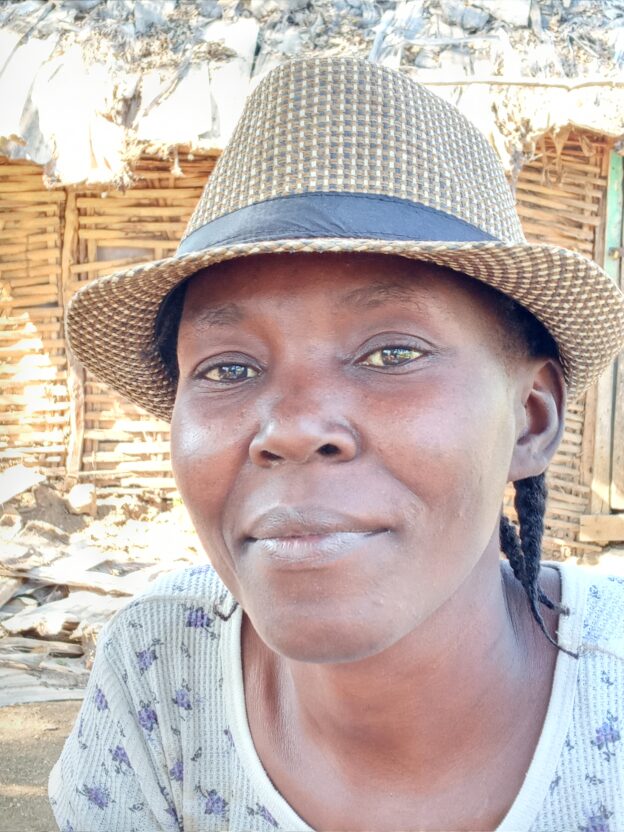Marie is a 35-year-old mother of two girls, age 18 and 16. They live in Tyera Miskadi with Marie’s husband, Honora, and the older daughter’s baby boy, who was abandoned by his father before he was born.
A cohort that included families from Tyera graduated in August of last year. And in a simpler world Marie and her family would have been part of that cohort. The CLM team’s plan, after all, is to pass from one community to another, always identifying everyone in the community who belongs in the program.
The reality, however, is more complex. Fonkoze depends on grant money to implement CLM, and grants always come with a number of families attached to them. We might receive funds to serve 50, 200, or even a thousand families at a time. But once we’ve selected the number we have funds for, we have to stop. Even if we are in the middle of a community. Tyera was the last community we entered during the prior cohort’s selection process, and we hit our limit before we completed work there. So Marie, her family, and other families as well were out of luck.
Neither Marie nor Honora are from the area. Marie is from Tomasik. She moved to Tyera with her mother when the older woman came to care for a grown daughter, Marie’s sister, who was sick. “My mother brought me along, and we just stayed.” Honora is from Senmichèl, a large town northwest of the Central Plateau. “He’s a field worker. He came to work in someone’s field, and he saw me.”
They have a house on a piece of land that they don’t own. “We stayed with various people for a while, but when you’re staying with people, now and again they make you feel ashamed. So someone said we could build our house on this piece of land.” The family doesn’t, however, live in the house any more. Its roof has deteriorated so badly that even the mildest rain gets through. So they took a single room in a nearby house. Its roof isn’t great either, but they are partly protected from at least the lighter rains.
Before they joined the CLM program, the couple really struggled to feed themselves and their kids. Honora earned all of their income. At first, he just did field work. Then he got a job substituting for the man who is supposed sweep the yard of the local school every day. That job would have paid very little, even in principle. But the school’s principal hasn’t been around for months, so Honora hasn’t been getting paid at all. He also takes care of someone’s cow, and the cow’s owner helps him occasionally. “When he sees we are going through a bad moment, he sometimes gives us something.”
The couple also takes care of three goats for their owners, who live in the Dominican Republic, and that should be a source of capital. Normally, the person caring for a female goat will be paid in offspring. But everything the couple has made through this arrangement has disappeared. “Some of the kids died, and some had to be sold to take care of our daughter.”
Their younger girl has a badly swollen foot, and it has been that way for years. Though they have taken her to see doctors, and spent a lot of money in the process, they’ve never found a solution.
Marie already sees possibilities in the program she’s entered. “I really liked the training. We learned a lot about keeping things clean. My daughters are still pretty lax, but I am keeping after them, and it’s starting to work.” She refused to spend the transportation stipend that the program provides during the initial training. Six days brought in 450 gourds — a little less than $5 — and she used the money to buy a pair of ducks. She thinks the female is ready to start laying eggs.
She chose goats and a pig as the enterprises for the program to transfer to her. She knows that small commerce could help her in ways that the livestock cannot. Only small commerce has a chance of providing steady income. But she doesn’t think that small commerce is possible right now. “There is no commerce these days.” She feels as though the local economy has slowed down so much in the last year or so that she’d have no way to make money.
Her ambition for her time in the program is straightforward. “I’d like to live differently.” But her explanation is unusual. Normally, new members talk of becoming wealthier, about acquiring things that they don’t have. Marie says nothing of the kind. “I want to apply what they said in the training and keep me and my daughters from being careless.”

Nice story. Beautiful woman.